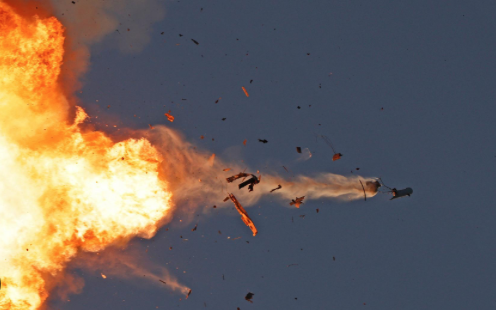Israel reported that it launched a series of preemptive strikes across southern Lebanon on Sunday to prevent a large-scale rocket and drone attack by Hezbollah. According to Israel’s military, jets destroyed thousands of rocket launchers belonging to the Iran-backed militant group. Hezbollah and its Amal allies confirmed that three of their fighters were killed.
Despite the strikes, Hezbollah claimed it managed to fire 320 rockets and drones into Israel in retaliation for the assassination of a senior commander. Israel’s military reported that one Israeli navy soldier was killed.
The U.S. has called for efforts to avoid further escalation after 10 months of hostilities that have fueled fears of a wider war.
Since the conflict between Israel and Hamas in Gaza erupted on October 7, there have been almost daily exchanges of fire across the Israel-Lebanon border. Recent U.S.-backed Gaza peace talks in Cairo failed to produce a breakthrough. Hamas rejected new Israeli conditions and accused Israel of reneging on previous commitments, which Israel denies.
Hezbollah has stated that its actions are in support of Hamas, another group backed by Iran. Both Hamas and Hezbollah are designated as terrorist organizations by Israel, the UK, and other countries.
Since October, Lebanon’s health ministry reports over 560 deaths, mostly Hezbollah fighters, while 26 civilians and 23 soldiers have died in Israel, according to official figures. The UN estimates nearly 200,000 people have been displaced on both sides of the border.
Israel’s preemptive strike at around 04:30 (01:30 GMT) on Sunday was its largest against Hezbollah since their full-scale war in 2006. The Israel Defense Forces (IDF) stated that approximately 100 fighter jets “struck and destroyed thousands of Hezbollah rocket launchers” in more than 40 locations across southern Lebanon. IDF spokesman Rear Admiral Daniel Hagari said the strikes followed the detection of preparations for a significant aerial attack by Hezbollah.
Lebanon’s state-run National News Agency reported that Israeli aircraft targeted several areas, including Beaufort Castle, and various towns across southern Lebanon. A resident of Zibqeen described the attack as feeling “like the apocalypse.”
A drone strike on a car in Khiam killed one person, according to Lebanon’s health ministry, while an Israeli attack on the village of Tiri claimed two lives. Hezbollah confirmed that two of its fighters from nearby Haris were among the dead.
“This is not the end of the story,” Israeli Prime Minister Benjamin Netanyahu said during a cabinet meeting. He added that while Israel had intercepted all drones launched by Hezbollah, the strikes marked a significant escalation in the northern conflict.
Foreign Minister Israel Katz emphasized that Israel does not seek a full-scale war but will take all necessary measures to protect its citizens.
Shortly after Israel’s strikes, Hezbollah claimed it had launched over 320 Katyusha rockets at 11 Israeli military facilities, including sites in Israel and the occupied Golan Heights. The group stated that the barrage was in response to the assassination of senior military commander Fuad Shukr in Beirut on July 30.
Hezbollah’s leader, Hassan Nasrallah, later said in a televised address that the group had targeted a military intelligence base near Tel Aviv and warned of further retaliation if deemed necessary. Lebanese Prime Minister Najib Mikati, whose government has limited control over Hezbollah, called for an end to “Israeli aggression” and the implementation of the UN resolution that ended the 2006 war. He also expressed support for international efforts to broker a ceasefire and hostage release deal between Israel and Hamas in Gaza.
U.S. National Security Adviser Jake Sullivan indicated that the U.S. is working to prevent the situation from escalating into a regional conflict, stressing the importance of reaching an agreement to de-escalate tensions along the Israel-Lebanon border. Hezbollah has indicated that it will only cease hostilities once the fighting in Gaza ends.
